
Nature + Culture
metrics 2024
Connecting Cultural Narratives with Environmental Realities
Introduction
Nature + Culture, published by BERGHAHN JOURNALS, focuses on the interdisciplinary exploration of cultural and environmental relationships, bridging the gap between the social sciences and ecological studies. With its ISSN 1558-6073 and E-ISSN 1558-5468, this journal has established itself as a key platform for scholars aiming to advance discussions in an era of rapid environmental change and cultural transformation. Operating from the United States, specifically at 20 Jay St, Suite 512, Brooklyn, NY 11201, it holds a respectable position within the academic community, evidenced by its Q3 ranking in Social Sciences (miscellaneous) for 2023 and its Scopus rank of #132 out of 275 in General Social Sciences. While currently not an Open Access journal, Nature + Culture provides vital insights that address the pressing issues of our time, making it an essential resource for researchers, professionals, and students committed to understanding the intersection of nature and human culture from 2008 through its converging years into 2024.
Metrics 2024
 0.19
0.19 0.40
0.40 0.70
0.70 25
25Metrics History
Rank 2024
Scopus
IF (Web Of Science)
JCI (Web Of Science)
Quartile History
Similar Journals

Intersecciones en Antropologia
Navigating the intersections of culture and knowledge.Intersecciones en Antropologia, published by the Universidad Nacional del Centro de la Provincia de Buenos Aires (UNICEN), Facultad de Ciencias Sociales, is a premier open-access journal in the field of anthropology, having established its presence since 2010. With an impressive impact factor and currently holding the distinguished Q1 quartile ranking in anthropology for 2023, this journal has quickly become a vital resource for scholars and practitioners alike, offering a platform for innovative research and critical discussion. The journal aims to advance anthropological scholarship by encouraging the dissemination of diverse perspectives and stimulating dialogue across geographical and cultural boundaries. Its open-access model, adopted in 2017, ensures that valuable research findings are accessible to a global audience, fostering collaboration and engagement within the academic community and beyond. Located in the vibrant cultural context of Argentina, Intersecciones en Antropologia serves as a conduit for significant anthropological dialogues, making it an essential read for those dedicated to understanding and contributing to the evolving landscape of social sciences.
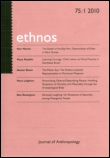
ETHNOS
Shaping Narratives, Enriching DiscoursesETHNOS is a leading journal published by Routledge Journals, Taylor & Francis Ltd, dedicated to advancing the field of anthropology and archaeology. With an impressive impact factor reflected in its high Scopus rankings—#23 in Archaeology and #44 in Anthropology—the journal is recognized for its rigorous scholarship and its influence on contemporary discussions in social science. Operating since 1936, ETHNOS provides a vital platform for innovative research and theoretical discourse, making it an essential resource for professionals, academics, and students alike. Although it does not offer Open Access, its meticulous editorial standards and Q1 classification in both Anthropology and Archaeology guarantee substantive contributions to the study of culture and society. Located in the United Kingdom, the journal continues to shape the narratives surrounding social and cultural phenomena, enriching the academic landscape up to 2024 and beyond.
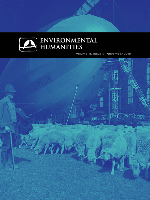
Environmental Humanities
Advancing Critical Perspectives on Environmental ChallengesEnvironmental Humanities, published by DUKE UNIVERSITY PRESS, is a premier journal that has established itself as a leading platform for interdisciplinary scholarship at the intersection of the environment and the humanities. With its open access framework since 2012, the journal fosters widespread dissemination of critical research that integrates perspectives from Anthropology, Ecology, and the Social Sciences. Currently holding impressive Q1 rankings in both Anthropology and Social Sciences for 2023, along with notable Q2 standings in Environmental Science fields, this journal provides a vital forum for innovative explorations of how human culture shapes and is shaped by environmental challenges. Situated in the United States, the journal encourages authors and thinkers to contribute to ongoing discussions about sustainability, ethics, and the cultural dimensions of environmental issues, making it an essential resource for researchers, professionals, and students alike. With a commitment to high-quality scholarship, Environmental Humanities plays a crucial role in advancing knowledge and understanding in a rapidly evolving field.

Anthropology Today
Innovating Perspectives on Human BehaviorAnthropology Today, published by WILEY, is a leading peer-reviewed journal in the field of anthropology, boasting a distinguished Q1 category ranking in the 2023 evaluations and a notable position within the top 79th percentile of its discipline according to Scopus. Established in the United States, this journal offers a rich compendium of contemporary anthropological research, covering diverse topics that shape the understanding of human cultures and societies. It is recognized for its rigorous academic standards and commitment to publishing innovative studies that reflect current trends and discussions within the field. While the journal is not open access, it provides insightful articles and reviews that are indispensable for researchers, professionals, and students seeking to enhance their knowledge and stay updated with the latest anthropological findings and theoretical advancements.
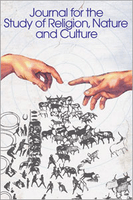
Journal for the Study of Religion Nature and Culture
Advancing Knowledge at the Intersection of Faith and NatureJournal for the Study of Religion Nature and Culture, a prominent academic journal published by EQUINOX PUBLISHING LTD, offers an interdisciplinary platform for scholars exploring the intricate relationships between religion, nature, and culture. With a Q1 ranking in Cultural Studies and Religious Studies, this journal holds a significant position, reflecting its impact and scholarly contributions within its field. The journal’s comprehensive scope encompasses contemporary issues at the intersection of these domains, welcoming innovative research that stimulates dialogue among academics from diverse backgrounds. While it is not currently an Open Access journal, the ISSN: 1749-4907 ensures its availability in libraries and institutions worldwide, fostering knowledge dissemination and engagement. Located in the United Kingdom and pioneering in its field since 2013, Journal for the Study of Religion Nature and Culture invites researchers, professionals, and students to contribute to its mission of advancing understanding of the profound connections shaping our world today.

Trumpeter-Journal of Ecosophy
Navigating the Complexities of Ecosophy with Scholarly RigorTrumpeter-Journal of Ecosophy, published by Athabasca University Press, is a distinguished journal dedicated to the interdisciplinary study of ecological and philosophical concepts. With its ISSN of 0832-6193, this journal fosters scholarly discourse on issues such as environmental ethics, sustainability, and the interconnections between human societies and the natural world. Although it does not operate under an open-access model, the journal aims to benefit researchers, professionals, and students alike, providing insights and critical perspectives that are vital in a rapidly evolving ecological landscape. Trumpeter embraces a unique role in the field of ecosophy, challenging contributors to explore fresh ideas and innovative solutions to pressing ecological dilemmas, and thus establishing itself as an essential resource for advancing knowledge in this important area of study.
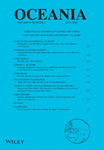
OCEANIA
Illuminating the Intersections of Culture and ThoughtOCEANIA, published by WILEY, is a distinguished journal that has been fostering scholarly discourse in the fields of anthropology and the history and philosophy of science since its inception in 1930. With an impressive impact factor and secure positions in the Q2 quartile for both categories, OCEANIA stands out as an influential resource for researchers and professionals alike. Its latest Scopus rankings reflect its commitment to quality, placing it in the 76th percentile for history and philosophy of science and the 66th percentile for anthropology. Though it does not operate under an open access model, the journal provides robust access options for institutions and individuals to explore its rich array of peer-reviewed articles that contribute to the understanding of cultures and scientific thought across the Pacific region and beyond. As we advance toward its continued convergence into 2024, OCEANIA remains a pivotal platform for innovative research and academic debate, cultivating insights that are crucial for scholars and students navigating the complexities of these interconnected disciplines.

ENVIRONMENT AND HISTORY
Unveiling the Past, Shaping the FutureENVIRONMENT AND HISTORY is a distinguished academic journal published by WHITE HORSE PRESS, focusing on the interdisciplinary study of environmental history and the intricate relationships between human societies and their environments. With an ISSN of 0967-3407 and an E-ISSN of 1752-7023, this journal serves as a vital platform for researchers, professionals, and students engaged in Arts and Humanities, Environmental Science, and Geography. Released in the United Kingdom, ENVIRONMENT AND HISTORY has been contributing to scholarly discourse since 1995 and continues to thrive with its current scope extending to 2024. The journal boasts impressive Scopus rankings, notably a 89th percentile in the field of History within the Arts and Humanities category. Although it operates without open access, the insights and findings published within its pages are invaluable to understanding historical contexts that influence current environmental challenges. Researchers and students alike can benefit from the journal's commitment to high-quality academic standards, reflected in its Q2 and Q4 categorizations across multiple subjects.

Regional Environmental Change
Exploring the Dynamics of Environmental TransformationRegional Environmental Change, published by SPRINGER HEIDELBERG, is a leading journal dedicated to the critical field of Environmental Science, specifically focusing on the global and planetary changes affecting our regional environments. Since its inception in 2005 and continuing through 2024, the journal has been a pivotal platform for disseminating cutting-edge research, insights, and methodologies that address pressing environmental issues. With an impressive Scopus rank, placing it in the top 30% of journals in its category, Regional Environmental Change (ISSN: 1436-3798; E-ISSN: 1436-378X) showcases high-quality academic articles that engage with the multifaceted impacts of environmental shifts, providing researchers, professionals, and students with vital knowledge and data. Although the journal does not currently offer Open Access, it remains a crucial resource for those committed to understanding and mitigating the effects of environmental change on regional ecosystems and communities.
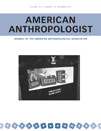
AMERICAN ANTHROPOLOGIST
Connecting scholars to a world of anthropological insights.American Anthropologist is a prestigious journal published by Wiley, dedicated to advancing the field of anthropology. With a rich publishing history dating back to 1888, it has become a leading platform for scholarly discourse, showcasing innovative research and diverse perspectives from around the globe. The journal holds impressive ranks within its categories, being recognized as Q1 in both Anthropology and Arts and Humanities, alongside a notable Scopus ranking of #36 out of 502 in Social Sciences. Its robust impact in academia is reflected in its emphasis on interdisciplinary approaches that resonate within the fields of social science and humanities. Researchers and students alike are encouraged to contribute to this vital resource that continues to shape anthropological thought and practice. For those interested, the journal is tailored for non-open access, ensuring the curation of high-caliber scholarly work accessible to a wide audience while supporting the standards of peer-reviewed publications.